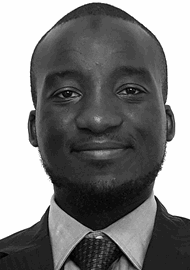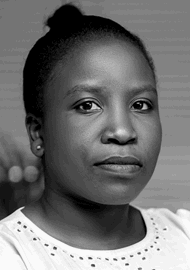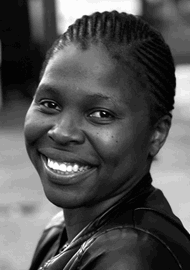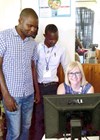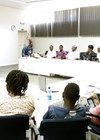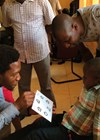Introduction
The 9th Annual Scientific Conference of the College of Ophthalmology of Eastern, Central and Southern Africa (COECSA) was held at the Bingu International Convention Centre in Lilongwe, Malawi in September 2022. The meeting was hosted by the Ophthalmological Society of Malawi (OSM) whose president is Shaffi Mdala.
This was the first face-to-face COECSA meeting following two years of the COVID-19 pandemic and was welcomed by Dr Mdala as an opportunity for delegates to come together to “brighten the future of sight and together learn more innovative ways to improve patient care and advance ophthalmology”.
Programme
The first day was dedicated to subspecialty areas – glaucoma, anterior segment, paediatric ophthalmology, public eye health, retina and orbit, with a session for young ophthalmologists on writing research proposals as well as courses on basic ‘phaco’, neuro-ophthalmology and advanced ‘Train the Trainers’.
The second day featured themed sessions on strengthening human resources for eye health, including diabetic retinopathy, with a session reserved for graduation of the new COECSA fellows. The keynote lecture was delivered by Ciku Mathenge on artificial intelligence (AI) in ophthalmology and the remaining sessions were on the topic of ‘conquering clinical uncertainties’ including the management of intraocular foreign bodies, complex cataract cases and how to deal with the malingering patient.
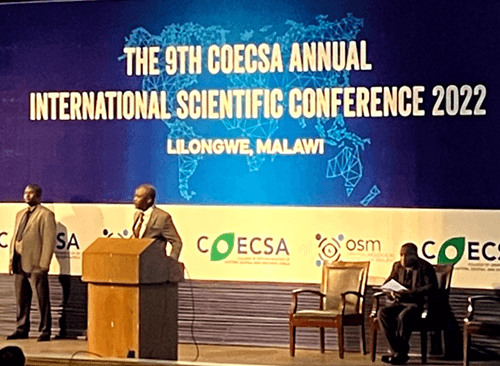
Deputy Minister of Health for Malawi, Honourable Enock Phale MP, opening the conference.
The themes on day three included strengthening networks and collaborations. This was an opportunity for the VISION 2020 LINKS Networks – DR-NET, Rb-NET and Glaucoma-NET – to be presented. A session on excellence in ophthalmic training and practice highlighted cascading of ‘Train the Trainers’ in the COECSA region and how to conduct a population-based survey. Khumbo Kalua from the Blantyre Institute for Community Outreach (BICO) in Malawi gave the keynote lecture on the elimination of trachoma from Malawi. The third day concluded with presentations on the Kenya retinoblastoma study, the COECSA Education and Accreditation Agenda and ‘2030 in sight’.
Earlier visit to The Royal College of Ophthalmologists (RCOphth) Congress in Glasgow in May 2022
The RCOphth had welcomed Chinsisi Nyirenda (COECSA Conference Organising Chair), Thokozani Zungu (OSM Scientific Chair), Esther Misanjo (Ophthalmologist in Blantyre) and Shaffi Mdala (OSM President), to the Congress in Glasgow earlier in the year. The aims of their visit had been to improve the planning of the COECSA meeting and help make the subspecialty sessions high quality and locally and internationally relevant to delegates, by talking to the RCOphth Congress organisers. In conversation with Chris Henson of Eye News, Dr Mdala said that the longstanding relationship with the VISION 2020 LINKS Programme had been very beneficial for Malawi over the years, through the LINKS between Lilongwe and Edinburgh and Fife (retina); Blantyre and Liverpool (retina) and Blantyre and Glasgow (paediatric), especially the training of ophthalmic clinical officers (OCOs) and ophthalmologists and improving research capacity in Malawi. Chinsisi Nyirenda reported that they had been able to visit the trade stands and had been generously donated tonometer probes for use in her hospital in Zomba.
Graduation ceremony
It was a pleasure, during the COECSA Conference, to witness the graduation ceremony for 34 new COECSA fellows, 16 from the 2021 intake and 18 new fellows following the recent 2022 exam in Blantyre. This was the first time the COECSA exam had been held in the same country and immediately preceding the COECSA conference and although it meant a great deal of hard work for examiners who were also involved in hosting the Congress, it was judged to be a great success and it is likely that the arrangement will be repeated next year when the COECSA conference is held in Mombasa, Kenya.
Highlights from the scientific sessions of the conference
Here we highlight a few of the presentations at the conference, which included a wide range of innovative and informative sessions including subspecialty areas and public health.
1. Glaucoma in Uganda
John Onyango and Viola Arunga from Mbarara University of Science and Technology in Uganda presented papers on glaucoma which revealed that the proportion of glaucoma patients identified at primary level facilities in Uganda was extremely low. This finding was in tandem with the low levels of eye health staff, low levels of glaucoma knowledge among primary level facility staff and lack of essential diagnostic and treatment facilities. Of the 78 facilities studied, only 10% had at least an ophthalmic clinical officer, only 39% of the primary health facility staff had a basic knowledge of glaucoma and only seven percent of the facilities had at least a direct ophthalmoscope. Only 14% had Timolol eye drops in stock at the time of the assessment.
In another survey they looked at barriers and strategies to glaucoma screening and management in the Uganda primary health care system. The commonest challenges to identifying and treating patients with glaucoma were lack of knowledge and awareness about glaucoma; lack of basic eye screening, diagnostic and surgical equipment, and drugs; patients reporting late to the eye clinic and poor staffing levels of eyecare workers across health facilities. They concluded that there is a need to address knowledge gaps of eyecare workers across primary and secondary level health facilities, and to have basic eye screening equipment at primary level health facilities and diagnostic and surgical equipment at secondary level health facilities. There is also a need to have glaucoma drugs available at all levels of health facilities as well as community sensitisation and mobilisation for glaucoma.
2. Retinoblastoma in Kenya
Kahaki Kimani from the University of Nairobi reported 14 years of experience with the Kenya National Retinoblastoma Strategy, which had been launched in 2008. Implementation of this strategy has resulted in a remarkable increase in the three-year survival of children with retinoblastoma from a dismal 26% to 69% in 12 years. Best Practice Guidelines were published through the Ministry of Health in 2014 and revised in 2019. The quality of care for retinoblastoma patients has improved with availability of treatments such as highly selective intra-arterial chemotherapy. Successful globe salvage improved from 40% in 2016 to 57% in 2020.
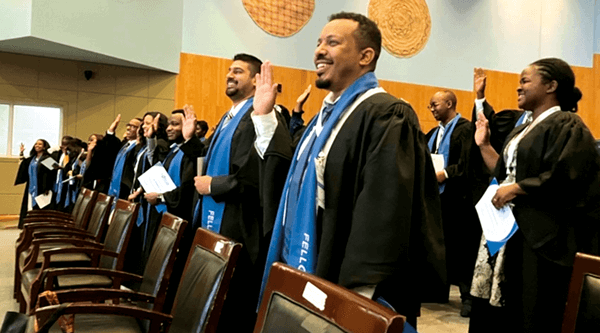
New COECSA Fellows taking the oath of the College.
One third of children diagnosed annually with retinoblastoma worldwide are in Africa and it is hoped that this success story can be replicated in other African countries, where survival rates are still very low. Dr Kimani pointed out that it is possible to greatly improve the management and outcome of retinoblastoma patients in Africa through intentional planning, implementation of national strategies and sharing knowledge and experience between countries.
COECSA Fellowship examinations
Muchai Gachago, the COECSA examination lead, wrote:
“This year the College of Ophthalmology of Eastern, Central and Southern Africa (COECSA) held its 12th Fellowship examination since its inception in 2010. It was held in Blantyre, Malawi, co-hosted by the Queen Elizabeth Central Hospital and the Kamuzu University of Health Sciences (KUHeS).
COECSA has continued to nurture its relationship with the RCOphth. This year we had Dylan Costello, Head of the RCOphth Exams, and Daniel Nolan, who is the lead for the RCOphth Part 1 exam, joining us to deliver our exam.
Through our partnership with the RCOphth and the affiliated member colleges of COECSA, we have continued to deliver high quality exams and the award of Fellow of COECSA has retained its prestige and continues to entice more ophthalmologists to join its membership.
Great strides have been made to elevate the COECSA Fellowship exam to a level where it serves as a complete exam into the profession of ophthalmology. This year’s graduation ceremony saw four residents complete training from the Rwanda International Institute of Ophthalmology (RIIO) having gone through the COECSA-approved curriculum and examination process and emerging as fully trained and accredited ophthalmologists.”
3. Artificial intelligence for eye health in Eastern sub-Saharan Africa
Nyawira Mwangi (Kenya) along with co-presenters Michael Gichangi (Kenya) and Simon Arunga (Uganda) presented on the Multimodal Database of Retinal Images for Africa (MODRIA) study. This is a five-year study with the aim of using retinal images and clinical data to develop and train AI-based algorithms for the detection and diagnosis of posterior segment eye disease (PSED) in an African population. The investigators (ophthalmologists, data scientists, computer scientists) expect to build a database of at least 15,000 images from adults with PSED and subpopulations at risk of PSED (such as those with diabetes, hypertension, HIV, or other conditions). The clinical data that is regularly collected in the health system (demographics, clinical and laboratory findings etc.) will also be collected.
The study sites are in Kenya (Kenyatta National Hospital and City Eye Hospital) and in Uganda (Mbarara Hospital and Ruharo Eye Centre). REDCap and the cloud will be used to facilitate collection and storage of data [1].
The objectives are:
- To create a database of retinal images (fundus photographs and OCT images)
- To develop and train AI-based algorithms to detect PSED
- To conduct implementation research on the feasibility and usability of using the algorithms in real world settings.
4. Trachoma in Malawi
At the opening ceremony of the conference, the Deputy Health Minister made the exciting announcement that the World Health Organization (WHO) had that day declared that Malawi had been validated as having successfully eliminated trachoma, the first country in southern Africa to do so [2].
This major achievement was further highlighted by Khumbo Kalua in his keynote lecture on the final day. The team at BICO had been dedicated to this work for the past 15 years. Many initiatives had to come together, including the formation of the National Trachoma Task Force, countrywide mapping, implementation of the SAFE Strategy (Surgery, Antibiotics, Facial Cleanliness and Environmental Improvement), over 6000 trachoma operations and considerable funding, latterly from the Queen Elizabeth Diamond Jubilee Trust. He stressed the importance of high-level advocacy and the value of partnerships and teams working together: ‘Success is best when it is shared!’, which was a highly appropriate note on which to end a very successful conference.
References
1. REDCap Cloud – Advanced data management and analytics solutions – Advanced data management and analytics solutions.
https://www.redcapcloud.com/
2. Malawi Eliminates Trachoma as a Public Health Problem (who.int).
https://www.who.int/news/item/21-09-2022-malawi
-eliminates-trachoma-as-a-public-health-problem
[All last accessed October 2022].
Watch Eye News in conversation with the Ophthalmological Society of Malawi here:
https://www.youtube.com/watch?v=19ugGxrPOZE
COMMENTS ARE WELCOME



